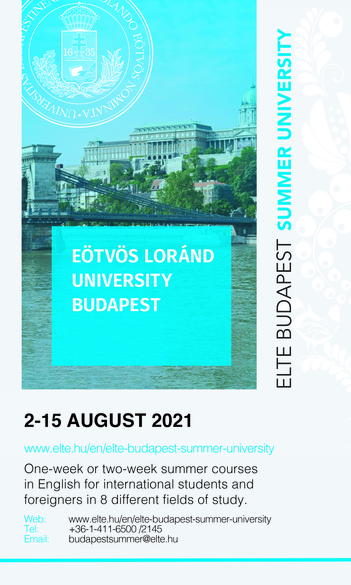How can I live among you? General principles and practices of care for persons with sensory disabilities in Hungary

When? 02 - 08. 08. 2021.
Where? ONLINE
Sensory disabilities are those that are caused by impairment to the senses. These mostly include people with visual and hearing impairments. The prevalence of visual impairment is increasing in developed countries due to ageing. This is why it is important to raise awareness of the society about the symptoms and diseases which most often occur, the challenges individuals with visual impairment face in their everyday life, and adapted solutions (methods, devices, services) which support the population and improve their social inclusion. Hearing impairment includes both deaf and hard of hearing people. It is defined by the fact that it usually impairs language functions, including speech comprehension and active speech. Their hearing abilities vary greatly, resulting in highly different communication needs. Because communication affects all aspects of society, we must be aware of the unique characteristics of people with hearing impairments in order to relate to them effectively and promote full social inclusion.
Structure of the course
Aug 2.
General characteristics of hearing impaired people
- The importance of hearing
- The concept of hearing impairment
- Consequences of hearing impairment
Audiology
- Types of hearing loss
- What is an audiogram?
- Measurement of hearing
- Audiogram analysis
Aug 3.
Early intervention
- Information on early intervention and therapy of hearing impaired young children
- General language development
- What is early intervention?
- Early intervention as therapy
- Hearing loss and early intervention
- Characteristics of maternal speech (Infant-directed speech – IDS)
- Analysis of an early interaction - an example
Aug 4.
Special methodology
- Introduction to the pedagogy of hearing impaired children (surdopedagogy)
- The broad spectrum of approaches and techniques of current speech and language therapies for deaf and hard-of-hearing children
- Special aims, principles and aspects of the education of hearing-impaired children
- Methods
Mainstream setting
- The current situation of inclusive education in Hungary
Aug. 5.
- People with visual impairment in the World: prevalence and occurrence
- The most frequent eye diseases
- Accessible solutions for individuals with visual impairment
- Braille
- electronic solutions
Aug. 6.
Access to free time, leisure and sport:
- adapted physical activity and visual impairment
- audiodescription
People with visual impairment in the World: studying and working with a visual impairment.
Literature:
Akhtar, N., Dunham, F., & Dunham, P. J. (1991). Directive interactions and early vocabulary development: the role of joint attentional focus. Journal of Child Language, 18(1), 41–9.
Bergeron F., Berland A., Demers D. & Gobeil s. (2020) Contemporary Speech and Oral Language Care for Deaf and Hard‐of‐Hearing Children Using Hearing Devices. J. Clin. Med., 9, 378 p.
Gelfand S. A (2016). Essentials of Audiology. Thieme Medical Publishers, Inc. USA, New York.
Moeller MP, Carr G, Seaver L, Stredler-Brown A and Holzinger D. (2013). Best practices in family-centered early intervention for children who are deaf or hard of hearing: an international consensus statement. J Deaf Stud Deaf Education, 18(4):429-445.
Raeve,L.D. (2014): Paediatric Cochlear Implantation: outcomes and current trends in education and rehabilitation, Netherlands, Ipskamp Drukkers, Enschede, ISBN: 978-94-6191-918-2
World Health Organisation (2019). World report on vision.
List of lecturers (name + affiliation)
Andrea Détár drs, - ELTE Bárczi Gusztáv Faculty of Special Needs Education
Andrea Perlusz Ph.D - Hab. ELTE Bárczi Gusztáv Faculty of Special Needs Education
Eszter Loványi Ph.D - ELTE Bárczi Gusztáv Faculty of Special Needs Education
Éva Keresztessy - ELTE Bárczi Gusztáv Faculty of Special Needs Education
Ildikó Baranyi - ELTE Bárczi Gusztáv Faculty of Special Needs Education
Judit Gombás Ph.D - ELTE Bárczi Gusztáv Faculty of Special Needs Education
Maria Flamich Ph.D (free-lance expert)
Melinda Báder ELTE Bárczi Gusztáv Faculty of Special Needs Education
Monika Dukic drs, ELTE Bárczi Gusztáv Faculty of Special Needs Education
Rita Hoffmann Ph.D (free-lance expert)
Tünde Németh Ph.D - ELTE Bárczi Gusztáv Faculty of Special Needs Education
Back to ELTE Budapest Summer university 2021
E-mail: budapestsummer@elte.hu
Apply here